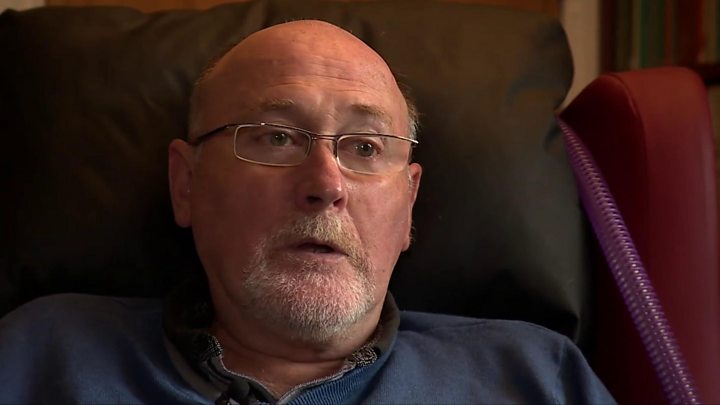Noel Conway, from Shropshire, has written three books using voice recognition software
A man who unsuccessfully campaigned for his right to die has said the current laws on assisted dying are “not fit for purpose”.
Noel Conway, 69, from Shropshire, who has motor neurone disease (MND), was refused permission by the Supreme Court to challenge the law in November.
His comments come ahead of a parliamentary debate on the existing assisted dying legislation.
Mr Conway described the present situation as “ripe for abuse”.
He said investigations into those who travel abroad for an assisted death take place after the event, meaning they “can’t really determine whether they were influenced unduly or not”.
He said it was “very difficult to investigate a case when the person about whom it revolves is already dead”.
November’s decision by the Supreme Court marked the end of a series of court cases in which Mr Conway failed in his bid to challenge the law on human rights grounds.
Image copyright
NOEL CONWAY
Before his illness Noel Conway was a keen skier, climber and cyclist
Diagnosed with MND in 2014, he wants to be able to ask a doctor to prescribe a lethal dose when his health deteriorates.
Currently, anyone who assisted someone to die would be liable to up to 14 years in prison.
The retired lecturer, who only has movement in his head and neck and uses a ventilator to help him breathe, has been spending recent months writing a series of books using voice recognition software.
“If I weren’t disabled I could take it [a lethal dose] anyway, there’s no-one to stop me, it is not illegal to commit suicide anymore,” he said.
“But people like me can’t do that so therefore it is a fundamental part of my human rights I cannot exercise.”

Media playback is unsupported on your device
However, the Care Not Killing Alliance campaign group argues the current laws protect the weak and vulnerable from being exploited or coerced.
Chief executive Dr Gordon MacDonald said “no major disability rights organisation or doctors’ group” supported changing law and there was “no safe system of assisted suicide and euthanasia anywhere in the world”.
He said “the safest law is the one we have”.
If you have been affected by any of the issues in this article you can visit the BBC Action Line.
Follow BBC West Midlands on Facebook, on Twitter, and sign up for local news updates direct to your phone.
